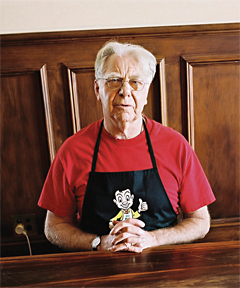In 2000, Joel Whitney (“No Mean Preacher”) had just left Tricycle, where he was website editor, to pursue an M.F.A. in poetry at Columbia. By 2003, he was teaching at Fordham University, had won a Discovery Prize for his poems, and was working on a poetry collection. But the week the first bombs fell on Baghdad, Joel was in Costa Rica, a nation with no military. He stayed on the beach in a hotel run by a French-Swiss couple. The morning after the family had watched videos of the bombing, their five-year-old daughter told Joel, “You are bad.” Joel agreed, marched in San José against the war, and began to write on politics. In 2004, he cofounded the online magazine Guernica, hoping to bring together literary work in translation by outstanding national writers and journalism on politics, human rights, and international affairs. Whitney has interviewed award-winning authors, Costa Rica’s Nobel Peace Prize-winning president, and gnarly neocons for Guernica. He has also contributed to the Nation, the New Republic, World Policy Journal, New York magazine, Paris Review, AGNI, and NPR. He lives in Brooklyn, where he is an occasional runner and a frequent bicycle donor (to those neighbors proactive enough to carry chain cutters). He is at work on a novel.
 Max Gimblett (“Oxherding”), born in New Zealand, is a painter living in New York City and a practicing Rinzai Buddhist who took vows in 2006 at the San Francisco Zen Center. Michael Wenger, his teacher, gave him the name Kongo Hitsu Kaku Shin—Diamond Brush Awakened Heart.
Max Gimblett (“Oxherding”), born in New Zealand, is a painter living in New York City and a practicing Rinzai Buddhist who took vows in 2006 at the San Francisco Zen Center. Michael Wenger, his teacher, gave him the name Kongo Hitsu Kaku Shin—Diamond Brush Awakened Heart.
Gimblett investigates the purity of material and form in his work, focusing primarily on canvas, paper from countries all over the world, and gilded wood panels. Gimblett’s artwork is heavily influenced by Asian art, particularly ink painting and calligraphy. He paints with “all mind/no mind” and “one stroke bone.” Gimblett conducts numerous sumi-e painting workshops at universities, schools, museums, and galleries.
Gimblett has created several books with poets including Robert Creeley, John Yau, Lewis Hyde, and Alan Loney. In 2009 his work was included in the exhibit “The Third Mind: American Artists Contemplate Asia, 1860–1989” at the Guggenheim Museum in New York City.
Gimblett’s ten paintings depicting the ancient Zen oxherding parable appear in this issue. He began the series after meeting translator, author, and poet Lewis Hyde at the Rockefeller Foundation’s Bellagio Center on Lake Como in Italy. Gimblett’s paintings, alongside Hyde’s translations of the Chinese oxherding poems, were on exhibit at New York’s Japan Society Gallery through January 16, 2011. When asked about the process of collaboration with Hyde, Gimblett simply replied, “Before, during, after.”